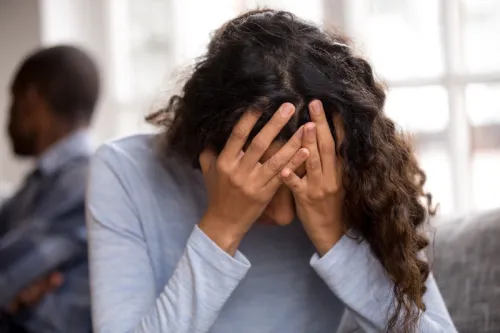These Are the Most Common Years Couples Break Up, According to Relationship Experts
Some moments in marriage are more turbulent than others.

Relationships can be complicated and unpredictable, and even some of the most beloved couples can end up in a split that no one saw coming. While there's no universal answer to why breakups happen, there are some patterns that arise when looking at when couples break up, based on how many years they have been together. Whether the novelty of the relationship wears off or the stress of having kids or them leaving the house drives people apart, read on to see the most common years that couples breakup, according to relationship experts.
READ THIS NEXT: 5 Body Language Signs That Mean Your Partner Wants to Break Up, According to Therapists.
1
Post-honeymoon phase.

When you enter a new relationship, it's easy to ignore small problems because you're so caught up in the positive feelings of falling in love. But when the pheromones start fading and the honeymoon stage comes to an end around year two or three, this marks a crucial time when many couples call it quits.
"The honeymoon phase can last from a few months to a couple of years and involves a lot of exciting newness and anticipation," says Kalley Hartman, LMFT, the clinical director at Ocean Recovery. "The three year mark is generally seen as the period in which many relationships break up due to this transition from infatuation to long-term commitment."
The happy time in the beginning can often trick couples into thinking they are destined to be together, but once the butterflies and rainbows are out of the picture, reality can set in.
"Most issues that cause a couple to break up stem from the foundation of their relationship in the first place," says Matthew King, dating expert and CEO of True Pheromones. "When you first start dating someone, it's normal to be so in love that you overlook the minor issues that may come up later. However, as the relationship progresses, these minor problems can grow larger and lead to major issues."
2
After kids.

Once a relationship has progressed a few more years down the line, some couples choose to have children to widen their family. Unfortunately, this exciting time can also lead to more breakups due to the added stress and exhaustion.
"The period immediately following bringing a child into the world poses increased demands on a relationship," says Lola Noero, LMSW, at Manhattan Therapy. "Couples wonder how they can balance running the role of caring for a whole separate human being, while maintaining healthy separation and space. Lack of sleep, overwhelming new roles, struggles balancing work/family, increased noise level, and chronic stress all play a part."
For more relationship tips sent directly to your inbox, sign up for our daily newsletter.
3
Year seven.

Once a relationship has progressed and has become stable over the years, it's perfectly normal for you to fall into a routine with one another. But, on the other hand, this stage in your relationship can feel stagnant and boring, which leads some people to throw in the towel.
"As relationships move on, it's common for couples to fall into a routine or become monotonous over time," says Hartman. "Couples may feel like they're growing apart or losing interest, which can lead to disputes that cause tension. Seven years is often cited as the point at which couples are more likely to break up due to a lack of novelty in the relationship."
4
Year 15.

It's natural for the magnetic spark you once felt for your partner to fade after being together for over a decade. This doesn't necessarily mean you are destined for divorce, but some couples find themselves living separate lives around 15 years and decide it's time to call it quits.
In a TikTok video by relationship counselor, Kim Polinder, she lists 15 as one of the most common years that couples break up. "If couples are struggling at year 15, it's because they have forgotten how to be friends," she explains. "They drifted apart and have started living their lives as roommates. They never really learned how to resolve conflict and instead they just learned how to disengage."
This may be a time where you should try and get the romance back into your relationship (sometimes the lack of spark can be from a lack of trying) or perhaps you'll come to the realization that it is long gone.
READ THIS NEXT: 7 Body Language Signs That Mean Your Partner Is Cheating, According to Therapists.
5
Retirement years.

According to the American Bar Association (ABA), divorce is on the rise for older adults and currently, the 50 plus crowd makes up a quarter of all divorces.
After the kids leave home when people are in their 50s and 60s, some people find themselves restless and unhappy in their marriage. With no children in the house to take care of anymore, many couples will separate after realizing that raising their kids was the only thing keeping them together.
"The loss or reprioritization of careers and the changing landscape of parenting when a child leaves the home stirs up an identity crises for many couples," says Noero. "Sometimes couples are left looking at each other over morning coffee thinking 'Now what? What do we talk about now'?"
Along with an empty nest, another reason divorce is common at this age is that people live longer, reports ABA. "Due to a longer life expectancy, these couples are finding themselves in their 50s and 60s, unhappy, and with 20 to even 40 more years left to live—and they want to do it their way."
Hartman adds, "After years together, couples may find that their expectations have changed. As they shift and evolve, it can become difficult for them to reconcile their differences or stay on the same page."





















